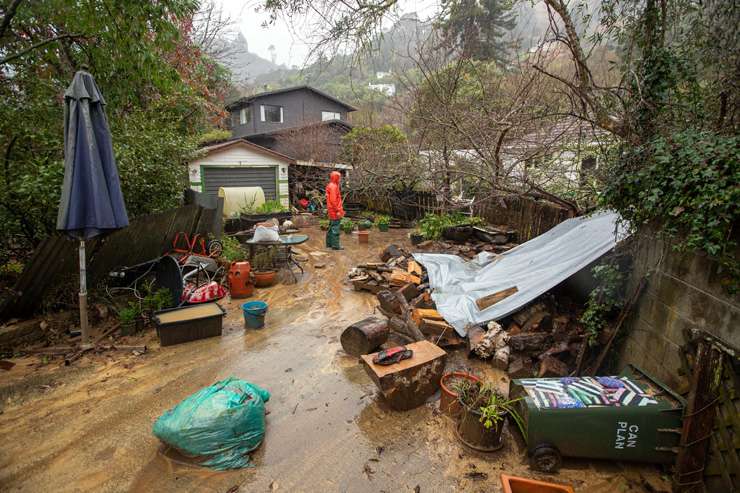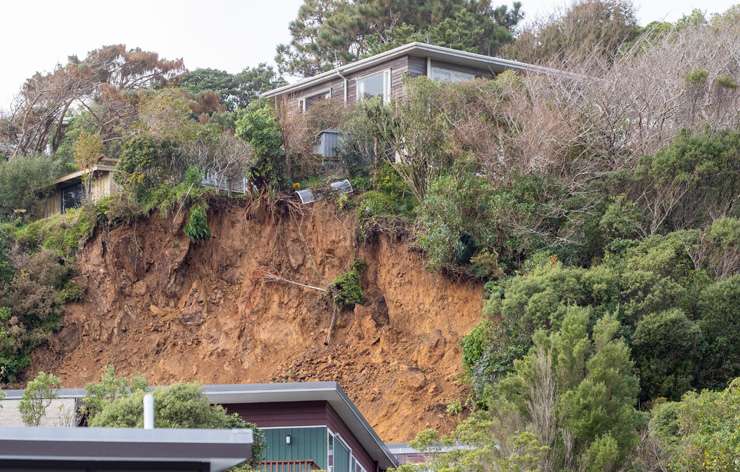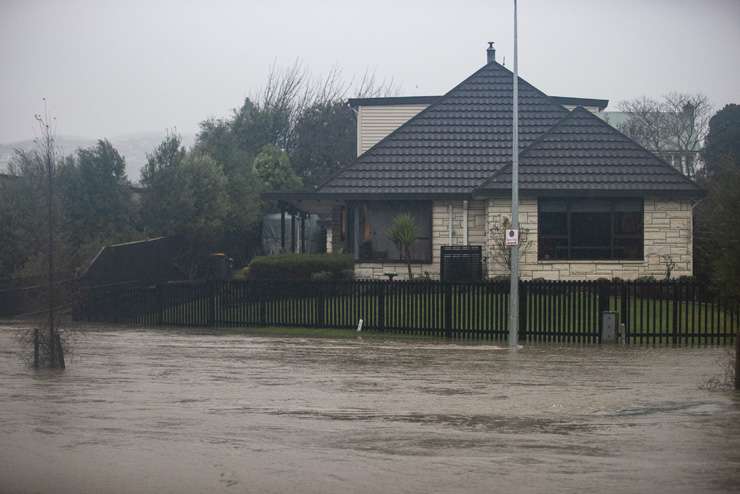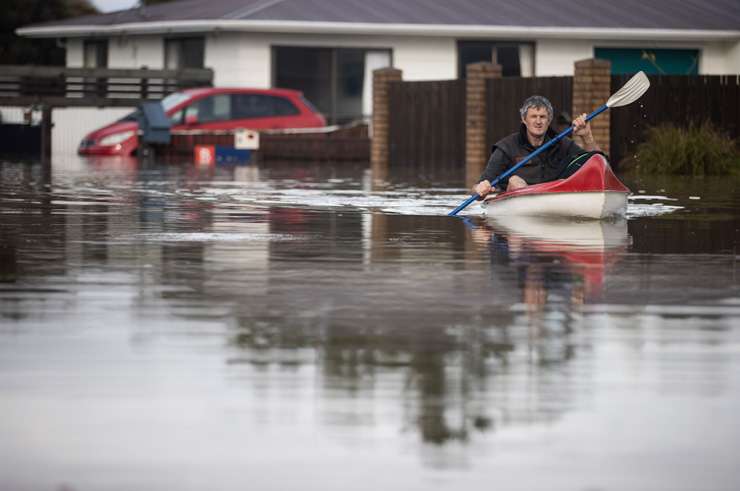With the annual cost of river flooding tipped to only rise due to climate change, some real estate agents in areas affected by slips and flooding say more regular weather events won’t stop some people buying for views and outlooks, although the buyer pool will likely get smaller.
As Nelson recovers from landslides and the bursting of the Maitai River, which saw dozens of homes evacuated, a new analysis shows the average annual cost of river flooding to residential buildings already tops $100m and is expected to rise significantly.
The analysis, by global data-driven organisations CoreLogic and Munich Re, shows the $100m figure could rise by more than 20 per cent by 2050 and by more than 30 per cent by 2100.
The analysis also says the 11 per cent of New Zealand’s residential property value currently exposed to river flood risk will increase to 17 per cent by 2050.
Start your property search
Regions most at risk include Otago, which the analysis says accounts for 5 per cent of the total national residential property value but which has 15 per cent of the national annual average river flood loss.
Auckland and Wellington are likely to see increased flood risk, and the Hawke’s Bay, Manawatu-Whanganui and Marlborough will see some of the highest increases in the average annual flood loss by 2050.
Munich Re, a German multinational insurance company, has a grim outlook for New Zealand with Australia managing director Scott Hawkins saying New Zealand will see an increase in both the frequency and severity of weather events due to climate change and communities and people need to manage their exposure to climate risks.
“Weather-related disasters might in sum become as destructive to New Zealand as earthquakes.”
Glyn Delany, a top agent for Summit Real Estate in Nelson, told OneRoof there are a lot of nervous people in the town.

A Nelson resident checks a property that backs onto the burst Maitai River. Photo / Tim Cuff
Nelson has a number of high-end properties on hills where the impact of slips on values won’t be known until people go to market.
“There’s a bit of stigma that will come along with that and the unknown ground conditions and what’s happened – I mean, there’s been so many slips and so many homes that have been affected and some are destroyed unfortunately.”
There are probably would-be buyers who now won’t go and look at a house for sale near the Matai River, or any other river for that matter, he says.
But while insurance costs will likely rise further people who want to live by the sea or on the hills are likely to be wealthy people who can afford to take the risk.
“The general public I think will shy away from homes that are next to rivers and probably shy away from sea level rise as well.”
The hill areas affected the most in Nelson are also the most sought-after areas, Delany says.
“The people that are nervous people, they’ll sell and move. But I think those people will be replaced by people that are willing to take the risk because they want to live in a home that has the view they’ve always wanted.
“What comes with a view is some risk; you’re living on a hill.”
Delany points out the Tahunanui Hills, which have sea and mountain views, have homes built in an area called the “Tahunanui Slump”.
“That ground has been moving for years and it will continue to move but it doesn’t stop people having multimillion homes there.”
“It's a stunning neighborhood, absolutely stunning homes and the views are just breathtaking really but there is risk involved.”
Despite Nelson's severe weather event, the phones are still ringing, Delany says.

The large slip threatening houses on and above above Woodhouse Avenue in Karori, Wellington, following days of heavy rain earlier this month. Photo / Mark Mitchell
Another part of the country which took a weather hammering last year was Ashburton in Canterbury but Kim Miller, owner of Ray White Ashburton, says though the state highway was cut off and some homes were damaged in Hinds, the majority of Ashburton homes were not affected.
“Mid-Canterbury is quite a stable type of market so we haven't experienced that stop of the phone ringing.”
Weather events in years gone by have resulted in some notes being added to titles with regard to flooding but those are quite historic, Miller says.
“This more recent weather event, all it did was make buyers ask, especially if they were out of region, was the property affected by the water?”
People are savvy and have access to a lot of information, such as Lim reports, Miller says, who also says it’s also the responsibility of agents to disclose a lot of that kind of information to buyers.
Charlie Elley, Property Brokers branch manager in Westport, says the little town on the West Coast of the South Island saw a pause in out of towners looking to relocate to Westport after their big flood 13 months ago.
Values weren’t affected so much as the timing of people’s move, he says.
“What was happening was an absolutely measurable shift into the district of people who were capitalising elsewhere, in other words selling in those big cities and they were coming here. They stopped.”

Flooding in Christchurch last month caused havoc for commuters and homeowners. Photo / George Heard
He says there hasn’t been a big flood since the big event over a year ago but whenever weather warnings hit the media he gets calls from people saying, “oh, I thought you guys were washed away.”
The town has plans to introduce flood protection and when that happens Elley expects out of towners to resume their house searching, and he thinks when the flood protection work is done people won’t be too concerned about flooding, saying nearby Greymouth had a flood wall put in during the 1980s.
“Greymouth used to be a place where you almost went there expecting it to be flooded in the next 12 months – it’s not even thought about now.”
A big problem is bureaucracy delaying what towns need to get done to protect them, he thinks, but he says Westport is still waiting.
“New Zealand is not the only country around the world where towns are close to river systems and you have floods but it seems to be something you'd think they'd just get on and do but it's almost like they have to reinvent the wheel when it comes to flood design.”
Back in Nelson, Delany says sea level rise is another issue that is talked about a lot but he’s not seen it impact the housing market as yet.
Just like the people who choose to live on hills, people who buy homes by the sea understand the risks involved but go ahead anyway because they want to live there.
“What we have seen is that a lot of people who want to live next to the sea will live next to the sea no matter what.”
Some experts, however, say Kiwi homeowners should be worried about climate change and while many are in denial, existing homeowners in at risk areas could find their homes in less demand and prices dropping.
Those people might not be able to borrow against at risk homes in the future, and insurance premiums could push homeownership out of reach.

Last July the town of Westport was completely flooded, leaving many residents homeless. Photo / George Heard
Belinda Storey, managing director of Climate Sigma, a climate risk Economic Research group, says that while climate risk isn't having a noticeable effect on property values so far, that's only a matter of time.
She says there is a time limit on how long properties subject to infrequent flooding are going to be safe.
REINZ, too, has big concerns. In April, the organisation published its Megatrends Report, which said both real estate professionals and the broader property profession needed to recognise climate risk as a core issue.
“Unprecedented extreme weather events are no longer unprecedented but rather predictable,” the authors wrote.
“As such, planning should account for continual bigger and more destructive floods and storms as well as rising sea levels.”
The potential for regions in New Zealand to become uninsurable would have clear impacts on real estate in those areas, they said: “Climate change will continue to have wide-ranging and significant impacts on the real estate profession.
“Banks, insurers, and consumer preferences will all continue to apply pressure to the profession.
“Coastal settlements and areas prone to flooding will be particularly vulnerable to climate change effects.”
- Additional reporting by Diana Clement



















































































